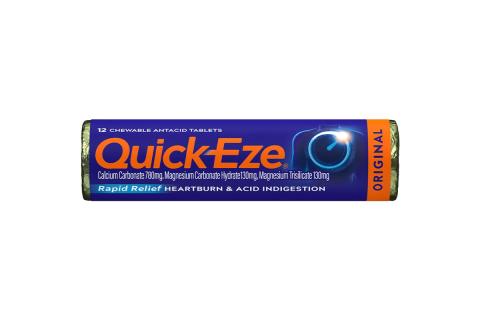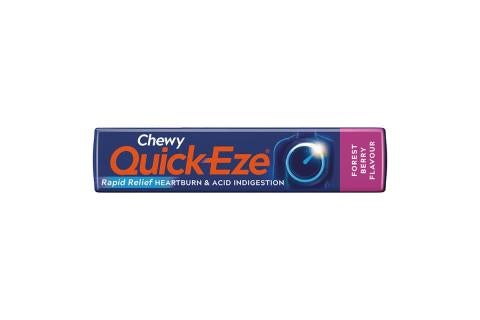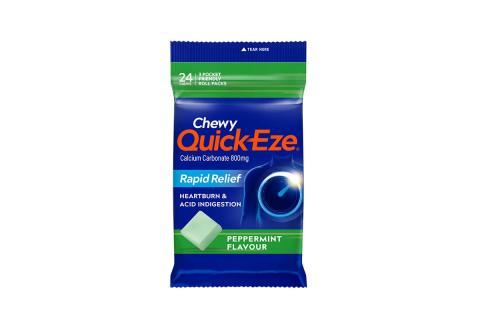Heartburn vs indigestion: what’s the difference?
Heartburn and indigestion are often confused, but they’re not the same. While heartburn causes a burning sensation in the chest, indigestion usually leads to bloating, nausea, or upper belly discomfort.1
Heartburn is the burning chest sensation caused by stomach acid rising into your oesophagus — usually after eating or when you lie down.1 Indigestion (aka dyspepsia) is more about general tummy discomfort. Think bloating, nausea, or feeling overly full too quickly.1 They might team up or turn up solo.
Heartburn vs indigestion symptoms
We’ve all had that “ugh, I shouldn’t have eaten that” moment, but how do you actually know whether it’s heartburn or indigestion you’re dealing with?
Let’s break down the usual suspects when it comes to heartburn vs indigestion symptoms, so you know what to look out for.

Heartburn symptoms can include:
- A burning feeling in the chest, often behind the breastbone1
- A sour or acidic taste in the mouth1
- Pain that worsens when lying down or bending over1
- A feeling like food is “stuck” in the throat or chest1

Indigestion symptoms can include:
- Bloating or feeling too full, especially after eating1
- Discomfort or pain in the upper abdomen1
- Nausea or queasiness1
- Excessive burping or gas1
While they can tag-team you after a heavy or spicy meal, these symptoms are usually your best clue for figuring out what you’re dealing with.
We have more in-depth guides on managing heartburn and indigestion symptoms if you’d like to learn more.
Key differences between heartburn and indigestion
Still not sure how to tell heartburn and indigestion apart? This cheat sheet can help you figure out what’s going on.
Symptoms commonly associated with heartburn and indigestion
Symptom1
Chest burning
Upper belly discomfort
Nausea
Bloating
Acidic or sour taste in mouth
Burping or belching
Discomfort after big meals
Reflux/acid moving upward
Feeling full quickly
Heartburn
✅
❌
❌
❌
✅
❌
✅
✅
❌
Indigestion
❌
✅
✅
✅
❌
✅
✅
❌
✅
Causes of heartburn and indigestion
So, what’s behind that burning or bloating? The causes of heartburn vs indigestion aren’t always the same, though they can overlap. Here’s what might be going on behind the scenes.
Common causes of heartburn1:
- Acid reflux (when stomach acid into the oesophagus)
- Spicy or fatty foods
- Chocolate, caffeine, or alcohol
- Eating too close to bedtime
- Smoking
Common causes of indigestion1:
- Eating too quickly
- Overeating or eating rich foods
- Stress and anxiety.
- Carbonated or acidic drinks
- Certain medications (like anti-inflammatories)
Treating heartburn and indigestion
If you’ve ever stood in the pharmacy aisle wondering whether you’re dealing with heartburn or indigestion, you’re not alone. The two often get lumped together and can sometimes show up at the same time.
When you’re feeling off, you want relief, fast. Thankfully, there are a few treatment options you can try depending on what’s causing the problem.
- Antacids (like Quick-Eze®) work by neutralising excess stomach acid and can offer fast relief for both heartburn and indigestion.
- H2 blockers and proton pump inhibitors (PPIs) help reduce acid production, which can be helpful if symptoms pop up regularly — especially in the case of heartburn.1
- Lifestyle changes (like slowing down your eating or avoiding trigger foods) can really help.1
- Probiotics or digestion aids might support overall gut health and help ease bloating.1
The effectiveness of Heartburn remedies and indigestion remedies will vary from person to person, so it’s worthwhile trying a good range to see what works best for your body.
If your symptoms don’t improve or keep coming back, it’s a good idea to check in with your GP for personalised advice.
Reducing the risk of heartburn and indigestion
Heartburn and indigestion might seem like they come out of nowhere, but often they’re the result of habits that build up over time. Or just one too many tacos on a Tuesday night. The good news? You might be able to tackle both by making a few simple lifestyle and dietary changes.
Whether you’re dealing with occasional flare-ups or trying to avoid future tummy trouble altogether, the key is paying attention to how and what you eat (and how you treat your body in general). The same changes that can contribute to your overall wellbeing can help ease both heartburn and indigestion. Win-win.
Here’s what may help:
- Eat smaller, more frequent meals – rather than getting overexcited at lunch1
- Avoid lying down right after eating – give your body time to digest properly.1
- Steer clear of known triggers – like spicy dishes, greasy food, fizzy drinks, or too much caffeine.1
- Take your time while eating – chew slowly and enjoy your meal.1
- Get moving – even a short walk after dinner can support digestion.1
- Stay hydrated – water is your gut’s best friend.1
Looking for healthy snack ideas that won’t mess with your gut? We just might have exactly what you’re looking for.
When to see a doctor about heartburn or indigestion
Most of the time, heartburn and indigestion are nothing to stress about. But what happens when that familiar burning in your chest or that bloated, uneasy feeling in your stomach sticks around a little too long? That’s when it might be time to check in with your GP.1
Heartburn and indigestion can be common experiences, but ongoing symptoms may be worth looking into. Ongoing discomfort might be your body’s way of waving a little red flag that something more serious is going on. And while a lot of the time it’s still nothing major, it’s always better to get things checked out early.
If you’re wondering whether what you’re feeling is normal or something worth investigating, here are a few signs that could mean it’s time to make an appointment with your GP or healthcare provider:
See a healthcare provider if you notice1:
- Frequent heartburn (more than twice a week)1
- Indigestion that doesn’t go away or gets worse1.
- Trouble swallowing or food getting stuck1
- Vomiting blood or having black stools1
- Unexplained weight loss1
If you experience any of these don’t ignore them. Trust your gut — literally — and speak to a doctor if something feels off.
Heartburn vs indigestion — knowing the difference
At the end of the day, heartburn and indigestion are both really common and often manageable issues that lots of us deal with from time to time1. While they can feel similar and show up together. Even though they may sometime have different causes, the approach to managing them is often similar — whether it’s taking an antacid, choosing milder meals over spicy takeaways, or checking in with your doctor.
By paying attention to your body, experimenting with a few small changes, and knowing when to seek help, you’ll be better equipped to keep your digestive system happy and avoid those uncomfortable moments.
FAQ: Heartburn vs indigestion
Still got questions? Here are answers to some of the most common ones people have when trying to figure out what’s going on with their gut and how to feel better, faster.
What’s the difference between heartburn and indigestion?
Heartburn is a burning feeling in your chest caused by acid reflux, where stomach acid travels up into your throat. Indigestion is more about general discomfort in your upper stomach — it can include bloating, nausea, or feeling overly full. Think of heartburn as a specific symptom, and indigestion as more of a catch-all term.1
Can I have both at the same time?
Absolutely. They often show up together, especially after a heavy or greasy meal. You might feel bloated, uncomfortable, and also have a burning sensation in your chest or throat. That combo is common and usually linked to what (and how much) you’ve eaten.1
Are there foods I should avoid if I keep getting symptoms?
Yes. Spicy food, citrus, fatty meals, caffeine, chocolate, and alcohol can all be common culprits. Carbonated drinks and even some dairy products can also be irritating for certain people. If you notice symptoms after eating something, try cutting it out for a bit and see if things improve.3
Is stress really a factor in all this?
It can be. When you're stressed, your body can slow digestion or become more sensitive to normal processes, which may lead to bloating, nausea, or discomfort. You might also eat more quickly or choose comfort food that’s harder to digest — all of which can lead to symptoms.1
Can you use antacids regularly?
Over-the-counter antacids like Quick-Eze® can be helpful for occasional relief. But if you find yourself relying on them more than occasionally. it’s a good idea to talk to your GP to figure out what’s causing the issue and whether a longer-term treatment plan is needed.
Can lifestyle changes actually make a difference?
For a lot of people, yes. Simple changes like adjusting you’re eating habits, staying active, avoiding trigger foods, and reducing stress can have a big impact on digestive comfort. It might not happen overnight, but over time, these habits can help prevent flare-ups and improve your overall gut health.4
References
[1] https://www.healthline.com/health/heartburn-vs-indigestion
[2] https://www.mayoclinic.org/diseases-conditions/gerd/symptoms-causes/syc-20361940
[3] https://www.healthline.com/nutrition/foods-that-cause-heartburn
[4] https://www.healthline.com/health/gerd/stress






